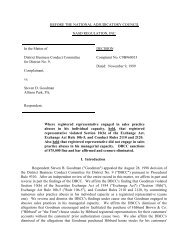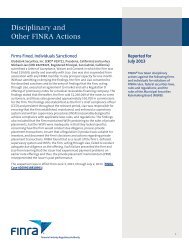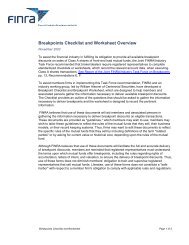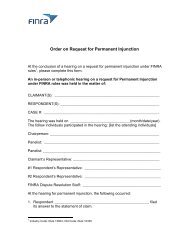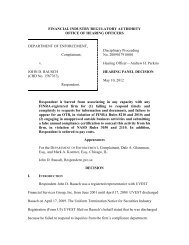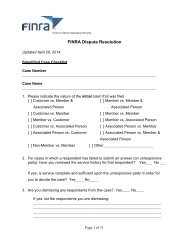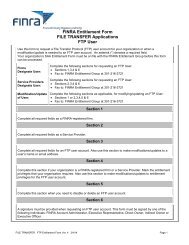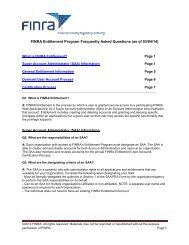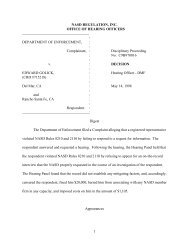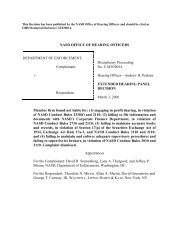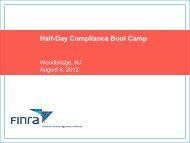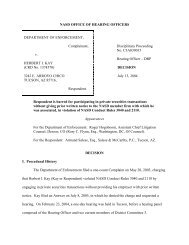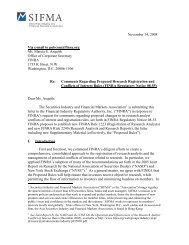OHO Proceeding No. 2008011725901 - finra
OHO Proceeding No. 2008011725901 - finra
OHO Proceeding No. 2008011725901 - finra
You also want an ePaper? Increase the reach of your titles
YUMPU automatically turns print PDFs into web optimized ePapers that Google loves.
FINANCIAL INDUSTRY REGULATORY AUTHORITY<br />
OFFICE OF HEARING OFFICERS<br />
DEPARTMENT OF ENFORCEMENT,<br />
v.<br />
Complainant,<br />
Disciplinary <strong>Proceeding</strong><br />
<strong>No</strong>. <strong>2008011725901</strong><br />
Hearing Officer – LBB<br />
CARLOS FRANCISCO OTALVARO<br />
(CRD <strong>No</strong>. 2294420),<br />
Respondent.<br />
HEARING PANEL DECISION<br />
Date June 24, 2011<br />
Respondent Carlos Francisco Otalvaro is suspended from associating with<br />
any FINRA member firm in any capacity for one year, barred from acting as<br />
a principal for any FINRA member firm, and fined $15,000 for willfully<br />
failing to disclose material information on his FormU4, willfully failing to<br />
update his Form U4 to disclose material information within the time<br />
required by NASD and FINRA Rules and By-Laws, and willfully filing<br />
amended Forms U4 that omitted material information, in violation of FINRA<br />
and NASD By-Laws, NASD Conduct Rule 2110, IM-1000-1, and FINRA<br />
Rules 1122 and 2010.<br />
Appearances<br />
Michael A. Gross, Esq., Regional Counsel, and David B. Klafter, Esq., Deputy Chief Regional<br />
Counsel, Boca Raton, Florida, for the Department of Enforcement.<br />
Carlos Francisco Otalvaro, pro se.<br />
DECISION<br />
The Department of Enforcement (“Enforcement”) filed the one-cause Complaint in this<br />
disciplinary proceeding on June 25, 2010, charging Respondent Carlos Francisco Otalvaro<br />
(“Respondent” or “Otalvaro”) with willful failure to disclose and untimely disclosure of material<br />
facts on his Uniform Application for Securities Industry Registration or Transfer (Form U4), and<br />
willful filing of false and misleading amendments to his Form U4, in violation of FINRA Rules
1122 and 2010, IM-1000-1, NASD Conduct Rule 2110, and FINRA and NASD By-Laws. 1 The<br />
alleged violations were related to seven arbitrations in which Otalvaro was named as a<br />
respondent. Respondent filed an Amended Answer on December 10, 2010, denying that the<br />
violations were willful, and stating that a Letter of Caution would be a sufficient sanction.<br />
A hearing was held in Boca Raton, Florida, on April 7, 2011, before a Hearing Panel<br />
composed of two current members of the District 7 Committee and a Hearing Officer.<br />
I. Respondent<br />
Respondent was first registered with a FINRA member firm in 1993. 2 From August 1997<br />
until December 2, 2010, he was registered though FINRA member firm WallStreet*E Financial<br />
Services, Inc. (“WSE”). 3<br />
Respondent is not currently registered with a FINRA member firm. At<br />
the time of the alleged violations, Respondent had Series 3, 7, 24, 27, 63, and 66 licenses. See,<br />
e,g,, CX-1.<br />
Respondent is the majority owner of WSE, and from 2004 through 2010, he was the<br />
firm’s president and chief compliance officer. Tr. 19, 80-81. Respondent was responsible for<br />
WSE’s filings in the Central Registration Depository (“CRD”). Tr. 19, 81.<br />
1 As of July 30, 2007, NASD consolidated with the member regulation and enforcement functions of NYSE<br />
Regulation and began operating under a new corporate name, the Financial Industry Regulatory Authority (FINRA).<br />
References in this decision to FINRA include, where appropriate, NASD. Following consolidation, FINRA began<br />
developing a new FINRA Consolidated Rulebook. The first phase of the new consolidated rules became effective<br />
on December 15, 2008, including certain conduct rules and procedural rules. See Regulatory <strong>No</strong>tice 08-57<br />
(Oct. 2008). This decision refers to and relies on the NASD and FINRA Conduct and Membership Rules that were<br />
in effect at the time of Respondent’s alleged violations: Article V, Section 2 of NASD’s By-Laws for violations<br />
from March 2005 until July 29, 2007; Article V, Section 2 of FINRA’s By-Laws for violations after that date;<br />
FINRA Rule 1122 for violations occurring on or after August 17, 2009; NASD Conduct Rule 2110 for violations<br />
prior to December 15, 2008; IM-1000-1 for violations from March 2005 through August 16, 2009; and FINRA Rule<br />
2010 for violations occurring on or after December 15, 2010. Because the changes in the By-Laws and Rules did<br />
not effect changes in the reporting requirements that are material to the violations charged by the Complaint, this<br />
decision does not analyze the violations individually with respect to the specific By-Law or Rule violated. The<br />
applicable rules are available at www.<strong>finra</strong>.org/rules.<br />
2 References to hearing exhibits submitted by Enforcement are designated as “CX-___.” Respondent did not submit<br />
any hearing exhibits. References to the hearing transcript are designated as “Tr. ___.”<br />
3 The firm was formerly known as WallStreet Electronica, Inc., and some of the arbitrations were filed against the<br />
firm in its former name. WSE’s FINRA membership was cancelled on December 2, 2010, for nonpayment of fees.<br />
Tr. 19.<br />
2
II.<br />
Facts<br />
WSE filed 27 amendments to Respondent’s Form U4 from January 1, 2005, through<br />
September 14, 2010. Respondent filed 25 of the amendments, submitting them both as the<br />
applicant and on behalf of WSE; two were submitted by another principal of WSE on behalf of<br />
the firm, and on Respondent’s behalf as the applicant. 4<br />
This case involves reporting failures with<br />
respect to 12 events that should have been disclosed on Respondent’s Form U4: failure to report<br />
or late reporting on Respondent’s Form U4 of seven customer arbitrations in which Respondent<br />
was a named respondent, and failure to report or late reporting of settlements of five of those<br />
seven arbitrations. 5<br />
The arbitration claims and settlements were required to be disclosed in response to<br />
Question 14I of the Form U4, which asks:<br />
(1) Have you ever been named as a respondent/defendant in an investment-related,<br />
consumer-initiated arbitration or civil litigation which alleged that you were involved<br />
in one or more sales practice violations and which:<br />
(a) is still pending, or;<br />
(b) resulted in an arbitration award or civil judgment against you, regardless of<br />
amount, or;<br />
(c) was settled for an amount of $10,000 or more?<br />
See, e.g., CX-5 at 10 (italics in original). The minimum amount for a reportable settlement was<br />
changed to $15,000 for settlements occurring on or after May 18, 2009. See, e.g., CX-21 at 15. 6<br />
As set forth in more detail in the attached table, Otalvaro was named as a respondent in<br />
seven arbitrations filed by WSE customers. All of the claims related to investments with WSE.<br />
4 See table attached to this Decision, and summary at CX-29. Don Lee, a branch office manager with a Series 24<br />
license, submitted CX-6 and CX-9 on behalf of WSE. Tr. 21, 103-104. Lee did not submit any forms unless<br />
Respondent had reviewed them. Tr. 81, 113.<br />
5 The table attached to this decision sets forth the relevant information concerning the arbitrations and settlements.<br />
6 The language changed somewhat over the period, primarily due to the change in the dollar amount of a reportable<br />
settlement.<br />
3
There were fraud claims against one or more of the arbitration respondents in each of the seven<br />
arbitrations. Other claims in the arbitrations alleged recommendation of unsuitable investments,<br />
conversion, excessive trading, and unauthorized trading. All of the arbitrations included claims<br />
against Otalvaro for supervisory failures, and at least one charged Otalvaro with active<br />
participation in the alleged fraud. Each of the five settlements exceeded $15,000.<br />
For these seven arbitrations, and five related settlements, Otalvaro either did not file an<br />
amendment to his Form U4, or filed the amendment more than 30 days after he learned of the<br />
reportable event. Five of the arbitrations and four of the settlements were ultimately disclosed on<br />
Otalvaro’s Form U4, but the disclosures were late, from 44 days to more than two years. Two<br />
arbitrations were never reported, and the settlement of one of the unreported arbitrations was<br />
never reported. 7<br />
In addition, Respondent filed a number of Forms U4 that failed to mention<br />
these reportable events, falsely answering “<strong>No</strong>” to Question 14I. When Respondent eventually<br />
reported some of the arbitrations and settlements, the Forms U4 reported some, but not all, of the<br />
reportable events, and were accordingly false and misleading.<br />
III. Respondent Violated FINRA and NASD By-Laws, NASD Conduct Rule 2110,<br />
IM-1000-1, and FINRA Rules 1122 and 2010, by Failing to Disclose and Late<br />
Disclosure of Information on His Form U4, and by Filing Inaccurate Forms U4<br />
Article V, Section 2 of FINRA’s By-Laws requires that persons who apply for<br />
registration with FINRA must provide “such … reasonable information with respect to the<br />
applicant as [FINRA] may require.” A registrant is under a continuing obligation to update<br />
information required by Form U4 as changes occur. 8<br />
Article V, Section 2(c) requires that<br />
“[e]very application for registration filed with the Corporation shall be kept current at all times<br />
7 Both of the unreported arbitrations were settled, and neither settlement was ever disclosed on Respondent’s Form<br />
U4. The Complaint charges Respondent with failing to report only one of the two unreported settlements. See table<br />
attached to this decision.<br />
8 Dep’t of Enforcement v. Neaton, <strong>No</strong>. 2007009082902, 2011 FINRA Discip. LEXIS 1, at *15 (N.A.C. Jan. 7,<br />
2011), appeal docketed, SEC Dkt. <strong>No</strong>. 3-14206 (Feb. 8, 2011).<br />
4
y supplementary amendments … filed with the Corporation not later than 30 days after learning<br />
of the facts or circumstances giving rise to the amendment.” FINRA uses the Form U4 to screen<br />
applicants and monitor their fitness for registration within the securities industry. 9<br />
Submitting a Form U4 that is inaccurate or incomplete so as to be misleading may be<br />
deemed conduct inconsistent with just and equitable principles of trade, in violation of NASD<br />
Conduct Rule 2110 and IM-1000-1. 10<br />
Similarly, FINRA Rule 1122, which superseded<br />
IM-1000-1 in August 2009, provides, “<strong>No</strong> member or person associated with a member shall file<br />
with FINRA information with respect to membership or registration which is incomplete or<br />
inaccurate so as to be misleading, or which could in any way tend to mislead, or fail to correct<br />
such filing after notice thereof.” 11<br />
When a registered representative’s Form U4 has not been<br />
promptly updated, the Form U4 is misleading, and the representative has violated NASD<br />
Conduct Rule 2110 and FINRA Conduct Rule 2010. 12<br />
As set forth in detail in the attached table, Respondent failed to amend his Form U4 to<br />
disclose arbitrations and settlements that he was required to report on his Form U4, filed<br />
amended Forms U4 that falsely stated that there were no arbitrations or settlements to disclose or<br />
disclosed only some of the arbitrations and settlements, and amended his Form U4 to disclose<br />
other information after the time required by FINRA’s By-Laws. The plain language of Question<br />
9 Dep’t of Enforcement v. Neaton, 2011 FINRA Discip. LEXIS 1, at *14-15.<br />
10 See IM-1000-1 (“The filing with the Association of information with respect to membership or registration as a<br />
Registered Representative which is incomplete or inaccurate so as to be misleading, or which could in any way tend<br />
to mislead, or the failure to correct such filing after notice thereof, may be deemed to be conduct inconsistent with<br />
just and equitable principles of trade and when discovered may be sufficient cause for appropriate disciplinary<br />
action.”); Dep’t of Enforcement v. Neaton, 2011 FINRA Discip. LEXIS 1, at *15; Scott Mathis, Exchange Act Rel.<br />
<strong>No</strong>. 61120, 2009 SEC LEXIS 4376, at *16 (Dec. 7, 2009), appeal docketed, <strong>No</strong>. 10-429-ag (2d Cir. Feb. 3, 2010).<br />
11 Amended by SR-FINRA-2009-009 eff. Aug. 17, 2009; see Reg. <strong>No</strong>tice 09-33.<br />
12 Richard G. Cody, Exchange Act Rel. <strong>No</strong>. 64565, 2011 SEC LEXIS 1862, at *54 (May 27, 2011); Dep’t of<br />
Enforcement v. Kaweske, <strong>No</strong>. C07040042, 2007 NASD Discip. LEXIS 5, at *33 (N.A.C. Feb. 12, 2007).<br />
5
14I required the disclosure of the arbitrations and settlements. All of the arbitrations were<br />
“investment related” as that term is used in the Form U4. The Explanation of Terms in the<br />
instructions for the Form U4 defines “investment-related” broadly. A matter is “investment<br />
related” if it “pertains to securities, commodities, banking, insurance, or real estate (including,<br />
but not limited to, acting as or being associated with a broker-dealer, issuer, investment<br />
company, investment adviser, futures sponsor, bank, or savings association).” See, e.g., CX-30<br />
at 2; CX-31 at 2; CX-32 at 2. The seven arbitrations related to securities, the actions of WSE as<br />
the broker-dealer for the claimants, and the actions of registered representatives who were<br />
associated with WSE.<br />
The Statements of Claim in the arbitrations show that each arbitration was filed by a<br />
customer of WSE, and therefore was “consumer-initiated.” 13<br />
Each alleged that Respondent was<br />
“involved” as the term is used in the Form U4. The Explanation of Terms for the Form U4<br />
defines “involved” as “doing an act or aiding, abetting, counseling, commanding, inducing,<br />
conspiring with or failing reasonably to supervise another in doing an act.” CX-30 at 2; CX-31<br />
at 2; CX-32 at 2. All of the Statements of Claim alleged that Respondent failed to supervise<br />
WSE representatives, and at least one Statement of Claim alleged that Respondent himself made<br />
misrepresentations.<br />
A “sales practice violation” is defined for the Form U4 as including “any conduct<br />
directed at or involving a customer which would constitute a violation of: any rules for which a<br />
person could be disciplined by any self-regulatory organization; any provision of the Securities<br />
Exchange Act of 1934 [(“Exchange Act”)]; or any state statute prohibiting fraudulent conduct in<br />
13 “Cases interpreting the term ‘customer’ in the securities context have viewed the term broadly to encompass<br />
individuals or entities that have some brokerage or investment relationship with the broker-dealer.” Dep’t of<br />
Enforcement v. Zayed, <strong>No</strong>. 2006003834901, 2010 FINRA Discip. LEXIS 13, at *18 (N.A.C. Aug. 19, 2010). All of<br />
the statements of claim asserted that the claimants were customers with accounts at WSE.<br />
6
connection with the offer, sale or purchase or a security or in connection with the rendering of<br />
investment advice.” CX-30 at 2 (emphasis in original); CX-31 at 2; CX-32 at 2. Each of the<br />
arbitrations included claims based on fraud and other alleged violations against at least some of<br />
the arbitration co-respondents, including at least one that asserted that Otalvaro had participated<br />
in the alleged fraud. All of the statements of claim alleged that Otalvaro had failed to supervise.<br />
All alleged violations for which Respondent could have been disciplined by FINRA.<br />
Respondent failed to disclose material information on his FormU4, failed to update his<br />
Form U4 to report material information within the required time, and filed Forms U4 that falsely<br />
stated that there were no reportable arbitrations or settlements, and others that reported some, but<br />
not all, of the reportable events. By these acts and omissions, Respondent violated FINRA’s and<br />
NASD’s By-Laws, NASD Conduct Rule 2110, IM-1000-1, and FINRA Rules 1122 and 2010.<br />
IV.<br />
Respondent is Subject to Statutory Disqualification<br />
Section 3(a)(39)(F) of the Exchange Act states that a person who files an application for<br />
association with a member of a self-regulatory organization, and who willfully omits any<br />
material fact in that application, is statutorily disqualified from participating in the securities<br />
industry. 14<br />
The information concerning the arbitrations was material, and Respondent’s<br />
reporting violations were willful under the standards used in securities law violations.<br />
Respondent is subject to statutory disqualification.<br />
A. The Information Concerning the Arbitrations Was Material<br />
Information required to be reported on a Form U4 is presumptively material. As the<br />
National Adjudicatory Council has stated, "Because of the importance that the industry places on<br />
full and accurate disclosure of information required by the Form U4, we presume that essentially<br />
14 See 15 U.S.C. § 78c(39)(F); see also FINRA By-Laws Art. III, Sec. 4; Dep’t of Enforcement v. Neaton, 2011<br />
FINRA Discip. LEXIS 1, at *17-18.<br />
7
all the information that is reportable on the Form U4 is material." 15<br />
Information omitted from a<br />
Form U4 is material if the omitted information would have significantly altered the total mix of<br />
information made available. 16<br />
The information that Respondent omitted was material. Information on investmentrelated<br />
customer arbitrations is important to regulators, investors, and potential employers.<br />
FINRA and other regulators would want to be aware of arbitrations promptly, because the filing<br />
or settlement of an arbitration might signal that there are problems that need regulatory attention,<br />
and multiple arbitration filings would cause greater concern. For example, the arbitrations filed<br />
against Respondent and his firm might have alerted regulators to possible supervisory problems<br />
and sales practice problems. Similarly, the settlement of five arbitrations in which Otalvaro was<br />
a respondent, each for more than $15,000, might indicate that the claims asserted in the<br />
arbitration were serious, and warrant regulatory attention. The payment of substantial<br />
settlements, for as much as $75,000, might indicate that the firm could have net capital issues.<br />
The filing and settlement of arbitrations would also be material to customers and<br />
potential customers, because arbitrations might raise questions about whether customers should<br />
rely on the broker. The “clean” reports would have falsely given customers comfort that the firm<br />
was free of customer problems and that Respondent was supervising the firm diligently, when, in<br />
fact, the pattern of arbitrations filed against Respondent, WSE, and its representatives, suggest<br />
the opposite.<br />
If Respondent had sought other employment, the arbitrations would also have been<br />
highly material to any potential employer. An employer considering Respondent as a principal<br />
15 Dep’t of Enforcement v. Neaton, 2011 FINRA Discip. LEXIS 1, at *21, quoting Dep't of Enforcement v. Knight,<br />
<strong>No</strong>. C10020060, 2004 NASD Discip. LEXIS 5, at *13 (N.A.C. Apr. 27, 2004).<br />
16 Scott Mathis, 2009 SEC LEXIS 4376, at *29 (quoting TSC Indus., Inc. v. <strong>No</strong>rthway, Inc., 426 U.S. 438, 449<br />
(1976)).<br />
8
or supervisor would want to know that claims had been filed against Respondent alleging that he<br />
had failed to supervise registered representatives at his firm, who had allegedly committed fraud<br />
and converted customer funds.<br />
The Hearing Panel finds that Respondent’s disclosure failures all involved material<br />
information.<br />
B. Respondent’s Violation Was Willful<br />
Under the securities laws, a violation is willful if Respondent voluntarily committed the<br />
act that constituted the violation. A finding that a violation was willful does not require proof<br />
that Respondent intended to violate the laws or rules. 17<br />
For violations relating to inaccurate<br />
Forms U4, “A willfulness finding is predicated on [the respondent’s] intent to commit the act<br />
that constitutes the violation – completing the Form U4 inaccurately.” 18<br />
A failure to disclose<br />
information on a Form U4 is willful if the Respondent voluntarily omitted the information from<br />
the Forms U4. 19<br />
Respondent understood that his Form U4 needed to be updated within 30 days of<br />
reportable events, as shown by the fact that he sometimes updated his Form U4, albeit tardily.<br />
Tr. 87-88. Respondent “voluntarily provided false answers on his Form U4” (or, in this case, 27<br />
Forms U4). 20<br />
Respondent acted voluntarily when he completed the Form U4 inaccurately. The<br />
evidence establishes that Respondent willfully omitted material information from his Form U4,<br />
17 Dep’t of Enforcement v. Zayed, <strong>No</strong>. 2006003834901, 2010 FINRA Discip. LEXIS 13, at *13 n.11 (Aug. 19,<br />
2010); see also, Dep’t of Enforcement v. Kraemer, <strong>No</strong>. 2006006192901, 2009 FINRA Discip. LEXIS 39, at *16<br />
(Dec. 18, 2009); Scott Mathis, 2009 SEC LEXIS 4376, at *19.<br />
18 Dep’t of Enforcement v. Neaton, 2011 FINRA Discip. LEXIS 1, at *18 (quoting Dep’t of Enforcement v.<br />
Zdzieblowski¸ <strong>No</strong>. C8A030062, NASD Discip. LEXIS 3, at *14 (N.A.C. May 3, 2005)).<br />
19 Dep’t of Enforcement v. Kraemer, 2009 FINRA Discip. LEXIS 39, at *16 (citing Jason A. Craig, Exchange Act<br />
Rel. <strong>No</strong>. 59137, 2008 SEC LEXIS 2844, at *1 (Dec. 22, 2008)); Scott Mathis, 2009 SEC LEXIS 4376, at *19.<br />
20 Scott Mathis, 2009 SEC LEXIS 4376, at *19; see also Dep’t of Enforcement v. Zayed, 2010 FINRA Discip.<br />
LEXIS 13, at *18 (finding that failure to update a Form U4 to disclose litigation of which respondent was aware was<br />
willful).<br />
9
and thereby violated FINRA and NASD By-Laws, NASD Conduct Rule 2110, IM-1000-1, and<br />
FINRA Rules 1122 and 2010.<br />
V. Sanctions<br />
For late filing of a Form U4, FINRA’s Sanction Guidelines (“Guidelines”) recommend a<br />
fine of $2,500 to $25,000. 21<br />
For failing to file a Form U4 or filing a false, misleading, or<br />
inaccurate Form U4, the Guidelines recommend a suspension in any or all capacities of five to<br />
30 business days and a fine of $2,500 to $50,000. The Guidelines recommend a longer<br />
suspension in any or all capacities or a bar in egregious cases, “such as those involving repeated<br />
failures to file, untimely filings or false, inaccurate, or misleading filings; those involving the<br />
failure to disclose or timely to disclose a … customer complaint.” The Principal Considerations<br />
for Form U4 violations are the nature and significance of the information, and whether the<br />
information resulted in a statutorily disqualified person remaining associated with a firm.<br />
Respondent’s violations were egregious. Respondent repeatedly failed to file or filed<br />
false Forms U4 for several years. He eventually filed late but inaccurate amendments, but only<br />
after he was alerted to the filing deficiencies and FINRA’s concerns by questions concerning the<br />
failure to file amendments to his Form U4 at a FINRA on-the-record interview on December 2,<br />
2008. Tr. 18, 81-82; CX-29. The information would have been highly significant to customers,<br />
and to FINRA and other regulators. The number of arbitrations and settlements suggests a<br />
possible pattern of sales practice violations and supervisory failures that went unreported for<br />
years.<br />
Respondent’s disciplinary history is an aggravating factor. In December 2009,<br />
Respondent entered into a consent order with the New Jersey Bureau of Securities, settling<br />
21 FINRA Sanction Guidelines at 71-72 (2011).<br />
10
charges that he had failed to supervise several representatives. He agreed not to supervise any<br />
agents or advisors registered with the Bureau of Securities. CX-54. In April 2010, the Florida<br />
Office of Financial of Financial Regulation filed an Administrative Complaint and <strong>No</strong>tice of<br />
Intent to Deny Pending Application and <strong>No</strong>tice of Rights against Respondent, WSE, and its<br />
affiliated investment advisor, WallStreetE Investment Advisors. The Complaint alleged that<br />
WSE had failed to establish and maintain an adequate system to supervise the activities of its<br />
associated persons. CX-55. On December 6, 2010, the Florida Office entered a Default Final<br />
Order and <strong>No</strong>tice of Rights, ordering Respondent to cease and desist from further violations of<br />
Chapter 517 of the Florida statutes, 22 revoking Respondent’s registration as an associated person<br />
of WSE, denying his pending application as an associated person of WallStreetE Investment<br />
Advisors, ordering Respondent and WSE to pay a $162,500 fine, and ordering Respondent and<br />
WallStreetE Investment Advisors to pay a $4,000 fine. CX-55.<br />
Respondent offers two explanations for his failures to file, apparently in mitigation rather<br />
than as defenses. First, he testified that the law firms involved in the arbitrations were supposed<br />
to have filed some of the amendments. Tr. 89. He did not identify any specific matters for<br />
which the law firms were supposed to file, and offered no evidence other than his vague and<br />
unsupported testimony that the law firms were responsible for any filings. He also said there<br />
were two other representatives at the firm who assisted him in compliance, suggesting that his<br />
subordinates might share some responsibility, and noted that the firm used an outside compliance<br />
consultant, but provided no evidence that either these representatives or the consultant had any<br />
responsibility with respect to the filing failures charged in the Complaint. Tr. 100-101.<br />
Respondent’s testimony was not credible. He could not have reasonably believed that others had<br />
22 Chapter 517 is the section of the Florida Statutes that governs securities transactions. See Florida Statutes,<br />
available online through www.law.cornell.edu.<br />
11
done any of the filings, especially given the duration and number of filing failures. If<br />
Respondent believed that others were supposed to have filed, he had ample notice that they did<br />
not. He should have seen that the 27 forms that were filed on his behalf by his firm, 25 of which<br />
he personally submitted, omitted information about some or all of the arbitrations and<br />
settlements. He also should have seen that there were no Forms U4 filed by the law firms on his<br />
behalf throughout this period, and that the two that were filed by another principal at his firm<br />
omitted material information.<br />
Furthermore, even if he had genuinely and reasonably believed that others had filed some<br />
of the forms, it would not be a mitigating factor. It is well established that a registered<br />
representative is responsible for maintaining his or her Form U4. 23<br />
Attempting to shift the blame<br />
to other representatives and law firms is especially inappropriate for someone who is the<br />
president and chief compliance officer of the firm, and responsible for the firm’s CRD filings.<br />
Respondent’s failure to accept full responsibility for his violations is an aggravating factor, not a<br />
mitigating factor.<br />
Respondent also asked the Hearing Panel to consider that, in his view, the CRD process<br />
was somewhat confusing and complicated. Tr. 14, 78. The Hearing Panel rejects this<br />
contention. The questions concerning arbitration claims and settlements on the Form U4 were<br />
quite clear, as were the instructions and the information on FINRA’s website. CX- 1-28, 30-32.<br />
In addition, Respondent was able to understand the process well enough to file 25 amendments<br />
to his Form U4.<br />
Even if Respondent’s reporting failures could be attributed to some confusion on his part,<br />
however, it would not be a mitigating factor. FINRA has repeatedly held that ignorance of the<br />
23 Richard G. Cody, 2011 SEC LEXIS __, at *__, slip op. at 24); Dep’t of Enforcement v. Kraemer, 2009 FINRA<br />
Discip. LEXIS 39, at *20 (“It was [Respondent’s] responsibility to make the requisite disclosures on his Forms<br />
U4.”)<br />
12
ules is no excuse for their violation. 24<br />
It is especially inappropriate for the president and chief<br />
compliance officer of a firm, with 10 to 15 years of industry experience at the time of his<br />
violations, to claim that he was confused by such basic forms and procedures. 25<br />
To the extent<br />
that Respondent had any difficulty understanding his obligations to keep his Form U4 current,<br />
and his obligation to file the updates as the principal of the firm who was responsible for the<br />
filings, it supports the imposition of a substantial suspension in all capacities.<br />
Each new arbitration filing or settlement should have served as a reminder to Respondent<br />
that he and WSE were obligated to ensure that his Form U4 was updated and accurate, yet<br />
Respondent continued to fail to report events and submitted 25 false Forms U4 on behalf of the<br />
firm. Respondent cannot be responsible for compliance and regulatory filings for a firm when he<br />
has shown that he is incapable or unwilling to comply with regulatory requirements with respect<br />
to his own Form U4. Any failure to understand the filing requirements and procedures for a<br />
Form U4 provides further evidence that Respondent is not capable of functioning as a principal.<br />
The Sanction Guidelines state that adjudicators may consider suspensions or a bar in any<br />
or all capacities. 26<br />
Respondent’s failure to maintain his own Form U4 for more than five years<br />
24 Dep’t of Enforcement v. Kraemer, 2009 FINRA Discip. LEXIS 39, at *20 (citing Richard J. Lanigan, 52 S.E.C.<br />
375, 378 (1995)).<br />
25 The fact that Respondent was the firm’s president and chief compliance officer is an aggravating factor. Harry<br />
Friedman, Exchange Act Rel. <strong>No</strong>. 64486, slip opinion at 12, 2011 SEC Lexis ___, at *__ (May 13, 2011); see also<br />
Philippe N. Keyes, Exchange Act Rel. <strong>No</strong>. 54723, 2006 SEC LEXIS 2631, at *21 (<strong>No</strong>v. 8, 2006) (finding that<br />
Respondent’s claimed ignorance of his obligations was “only aggravated in light of his fifteen years experience in<br />
the securities industry….”).<br />
26 FINRA Sanction Guidelines at 71-72 (2011).<br />
13
shows that he is incapable of performing the duties of a principal. 27<br />
Respondent was the<br />
president of the firm, the chief compliance officer, and the person responsible for filings, and<br />
thus was responsible for the firm’s regulatory filings in three separate capacities. Respondent<br />
ignored his responsibilities to ensure that WSE was complying with reporting requirements even<br />
with respect to his own Form U4. 28<br />
Respondent is barred as a principal.<br />
A one-year suspension in all capacities and a bar as a principal are both appropriate. A<br />
$15,000 fine is appropriate to reinforce the seriousness of Respondent’s violation.<br />
VI.<br />
Conclusion<br />
Respondent Carlos Francisco Otalvaro is suspended from association with any FINRA<br />
member firm in any capacity for one year, barred from acting as a principal for any FINRA<br />
member firm, and fined $15,000, for willfully failing to disclose material information on his<br />
Form U4, willfully failing to update his Form U4 to disclose material information within the<br />
required time, and willfully filing Forms U4 that omitted material information, in violation of<br />
FINRA’s and NASD’s By-Laws, NASD Conduct Rule 2110, IM-1000-1, and FINRA Rules<br />
1122 and 2010. Respondent is subject to statutory disqualification.<br />
27 The Complaint does not expressly identify the capacities in which Respondent was charged or in which sanctions<br />
were being sought. Respondent had adequate notice that he was subject to sanctions in any or all capacities,<br />
including his capacity as a principal. Respondent was clearly aware that he had duties to maintain an accurate Form<br />
U4 both in his capacity as a registered person and as a principal. The Sanction Guidelines recommend a suspension<br />
in any or all capacities, which should have provided notice that he was subject to a suspension in any appropriate<br />
capacity, including his capacity as a principal. Furthermore, Enforcement’s pre-hearing brief requested a bar in<br />
Respondent’s capacity as a principal. See Department of Enforcement’s Pre-Hearing Brief, filed March 3, 2011, at<br />
11-12. Respondent was clearly not misled, and did not state at any time that he was. John M. Saad, Exchange Act<br />
Rel. <strong>No</strong>. 62178, 2010 SEC LEXIS 1761 (May 26, 2010) (appeal docketed, <strong>No</strong>. 10-1195 (D.C. Cir. July 22, 2010)<br />
(“As long as a party to an administrative proceeding is reasonably apprised of the issues in controversy and is not<br />
misled, notice is sufficient.") (internal quotations and citations omitted).<br />
28 For a responsible principal, the Guidelines recommend consideration of a fine of $5,000 to $100,000, suspension<br />
of the principal in all supervisory capacities for 10 to 30 business days, and, in egregious cases, consideration of a<br />
suspension in any or all capacities (of up to two years) of the responsible principal or a bar of the responsible<br />
principal in all supervisory capacities. Guidelines at 71-72 (2011).<br />
14
If this decision becomes FINRA’s final disciplinary action, the bar prohibiting<br />
Respondent from associating with any FINRA member firm in any principal capacity shall be<br />
effective immediately. The suspension in all capacities shall become effective upon the opening<br />
of business on August 15, 2011, and end at the close of business on August 14, 2012. The fine<br />
shall be due and payable upon Respondent’s return to the securities industry. 29<br />
Respondent is also ordered to pay the costs of the hearing, in the amount of $1,858.40,<br />
which includes an administrative fee of $750 and the cost of the hearing transcripts.<br />
Hearing Panel.<br />
___________________________<br />
Lawrence B. Bernard<br />
Hearing Officer<br />
Copies to:<br />
Carlos Francisco Otalvaro (via overnight courier and first class mail)<br />
Michael A. Gross, Esq. (via electronic and first class mail)<br />
David B. Klafter, Esq. (via electronic and first class mail)<br />
Mark P. Dauer, Esq. (via electronic mail)<br />
David R. Sonnenberg, Esq. (via electronic mail)<br />
29 The Hearing Panel has considered all of the arguments of the parties. They are rejected or sustained to the extent<br />
they are inconsistent or in accord with the views expressed herein.<br />
15
Event<br />
Date<br />
Arbitration or<br />
Settlement<br />
2004 O.D. customer<br />
arbitration filed.<br />
CX-34 31<br />
Apr. 18,<br />
2005 and<br />
May 2005<br />
Feb. 26,<br />
2006<br />
E.L. customer<br />
arbitration, Motion<br />
for Leave to Amend<br />
to Add Parties to<br />
arbitration. CX-36.<br />
(Motion granted,<br />
adding Respondent<br />
as arbitration<br />
respondent, May<br />
2005. CX-37.)<br />
Settlement of E.L.<br />
customer arbitration.<br />
CX-39<br />
Nature of Arbitration<br />
or Settlement, and<br />
Respondent’s Role<br />
Respondent’s Form U4 Violations<br />
Event<br />
Establishing<br />
Respondent’s<br />
Knowledge<br />
Fraud claim against WSE<br />
registered representative,<br />
alleging misuse of<br />
customer funds.<br />
Respondent charged with<br />
negligent supervision.<br />
Investment-related fraud<br />
claim for unsuitable<br />
trading, conversion of<br />
funds invested with<br />
mutual funds. Claim<br />
added against<br />
Respondent for negligent<br />
supervision.<br />
WSE pays customer<br />
$17,750, guaranteed by<br />
Respondent.<br />
Answer filed<br />
Feb. 23, 2005,<br />
signed by<br />
Respondent.<br />
CX-35<br />
Answer and<br />
Motion to<br />
Dismiss, dated<br />
June 25, 2005.<br />
Submitted by<br />
Respondent.<br />
CX-38<br />
Respondent<br />
signs on Feb.<br />
26, 2006.<br />
CX-39<br />
Forms U4 <strong>No</strong>t<br />
Reporting<br />
Event 30<br />
CX- 2 – CX-28<br />
CX-3 – CX-28<br />
CX-6 – CX-28<br />
First Form U4<br />
Reporting<br />
Arbitration or<br />
Settlement<br />
<strong>No</strong>t reported on<br />
any Form U4<br />
<strong>No</strong>t reported on<br />
any Form U4<br />
<strong>No</strong>t reported on<br />
any Form U4<br />
Amount<br />
Late<br />
<strong>No</strong>t reported<br />
<strong>No</strong>t reported<br />
<strong>No</strong>t reported<br />
30 WSE filed Forms U4 for Respondent on the following dates from September 2004 through September 2010: Jan. 14, 2005 (CX-2); <strong>No</strong>v. 30, 2005 (CX-3);<br />
Dec. 15, 2005 (CX-4); Jan. 19, 2006 (CX-5); <strong>No</strong>v. 20, 2007 (CX-6); <strong>No</strong>v. 27, 2007 (CX-7); Dec. 5, 2007 (CX-8); Jan. 17, 2008 (CX-9); Jan. 2, 2009 (CX-10);<br />
Jan. 15, 2009 (CX-11); Jan. 16, 2009 (CX-12); Jan. 22, 2009 (CX-13); Jan. 26, 2009 (CX-14); Jan. 27, 2009 (CX-15); Feb. 23,2009 (CX-16); March 3, 2009<br />
(CX-17); March 11, 2009 (CX-18); March 30, 2009 (CX-19); May 13, 2009 (CX-20); Aug. 11, 2009 (CX-21); Aug. 12, 2009 (CX-22); Jan.11, 2010 (CX-23);<br />
Jan. 12, 2010 (CX-24); Jan. 20, 2010 (CX-25); Jan. 22, 2010 (CX-26); Apr. 27, 2010 (CX-27); Sept. 14, 2010 (CX-28). See summary at CX-29. Don Lee, a<br />
branch office manager with a Series 24 license, signed CX-6 and CX-9 on behalf of WSE. Tr. 21, 103-104.<br />
31 This matter was settled with a $36,000 payment to the arbitration claimant. Tr. 32. The failure to file an amended Form U4 with respect to the settlement was<br />
not charged as a violation.<br />
16
Event Date<br />
Mar. 31,<br />
2006<br />
Sept. 25,<br />
2006<br />
Oct. 2, 2007<br />
Dec. 15,<br />
2006.<br />
Arbitration or<br />
Settlement<br />
O.I.G. customer<br />
arbitration. CX-40<br />
G.E. customer<br />
arbitration. CX-42<br />
Settlement of G.E.<br />
customer<br />
arbitration. CX-44<br />
G.S. customer<br />
arbitration. CX-45<br />
Nature of Arbitration<br />
or Settlement, and<br />
Respondent’s Role<br />
Fraud and other claims<br />
against WSE,<br />
Respondent, and others,<br />
in liquidating equities.<br />
Fraud in sale of mutual<br />
fund, unauthorized<br />
trading. Claim against<br />
Respondent alleges<br />
supervisory failures.<br />
WSE pays customer<br />
$60,000. Respondent<br />
guarantees payment.<br />
Unsuitability, excessive<br />
trading, fraudulent bond<br />
sale. Claim against<br />
Respondent alleges<br />
supervisory failures.<br />
Event<br />
Establishing<br />
Respondent’s<br />
Knowledge<br />
Motion to<br />
dismiss filed<br />
June 26, 2006.<br />
CX-41 (matter<br />
dismissed, CX-<br />
41 at 2)<br />
Answer and<br />
counterclaim by<br />
WSE and<br />
Respondent,<br />
<strong>No</strong>vember 17,<br />
2006, through<br />
counsel.<br />
CX-43<br />
Respondent<br />
signs settlement<br />
agreement on<br />
Oct. 2, 2007.<br />
CX-44<br />
Answer and<br />
Counterclaim<br />
served by<br />
Respondent’s<br />
counsel,<br />
Feb. 26, 2007.<br />
CX-46<br />
Forms U4 <strong>No</strong>t<br />
Reporting<br />
Event<br />
First Form U4<br />
Reporting<br />
Arbitration or<br />
Settlement<br />
CX-6, CX-7 Dec. 5, 2007<br />
CX-8 at 18<br />
CX-6 – CX-4 Jan. 27, 2009<br />
CX-15 at 23<br />
CX-6 - CX-14 Jan. 27, 2009<br />
CX-15 at 23<br />
CX-6 - CX-14 Jan. 27, 2009<br />
CX-15 at 16<br />
Amount<br />
Late<br />
More than 16<br />
months<br />
More than 2<br />
years<br />
More than 14<br />
months<br />
11 months<br />
17
Event Date<br />
Feb. 8 – 12,<br />
2008<br />
June 2007<br />
<strong>No</strong>v. 14,<br />
2008<br />
Arbitration or<br />
Settlement<br />
Settlement of G.S.<br />
customer<br />
arbitration<br />
agreement. CX-47<br />
M.G. customer<br />
arbitration. CX-48<br />
Settlement of<br />
M.G. customer<br />
arbitration. CX-50<br />
Nature of Arbitration<br />
or Settlement, and<br />
Respondent’s Role<br />
WSE pays customer<br />
$75,000. Respondent<br />
guarantees payment.<br />
Fraud by WSE<br />
representatives<br />
recommending sale of<br />
securities to invest in<br />
hedge fund. Claim<br />
against Respondent<br />
alleges supervisory<br />
failures. 33<br />
Respondent pays<br />
customer $50,000.<br />
Event<br />
Establishing<br />
Respondent’s<br />
Knowledge<br />
Settlement<br />
agreement Feb.<br />
8, 2008.<br />
CX-47 32<br />
Motion to<br />
Dismiss,<br />
Answer and<br />
Counterclaim<br />
served by<br />
counsel, July<br />
30, 2007.<br />
CX-49<br />
Respondent<br />
signs settlement<br />
agreement<br />
<strong>No</strong>vember 14,<br />
2008.<br />
CX-50<br />
Forms U4 <strong>No</strong>t<br />
Reporting<br />
Event<br />
First Form U4<br />
Reporting<br />
Arbitration or<br />
Settlement<br />
CX-10 - CX-14 Jan. 27, 2009<br />
CX-15 at 16<br />
CX-6 <strong>No</strong>v. 27, 2007<br />
CX-7 at 16<br />
CX-10 - CX-14 Jan. 27, 2009<br />
CX-15 at 21<br />
Amount<br />
Late<br />
10 months<br />
Almost 3<br />
months<br />
44 days<br />
32 The settlement agreement in the record not signed by Respondent, but was signed by the claimants on February 8, 2008. Respondent’s Form U4 states that the<br />
matter was settled on Feb. 8, 2008. CX-15 at 17.<br />
33 The Statement of Claim is not clearly drafted, but a number of allegations suggest that the claim against Respondent was also based on allegations that<br />
Respondent had participated in the fraud.<br />
18
Event Date<br />
July 2007<br />
<strong>No</strong>v. 14,<br />
2007<br />
Arbitration or<br />
Settlement<br />
C.C. customer<br />
arbitration. CX-51<br />
Settlement of C.C.<br />
customer<br />
arbitration. CX-5<br />
Nature of Arbitration<br />
or Settlement, and<br />
Respondent’s Role<br />
Fraud by WSE<br />
representatives<br />
recommending sale of<br />
securities to invest in<br />
hedge fund. Claim<br />
against Respondent<br />
alleges supervisory<br />
failures. 34<br />
WSE pays customer<br />
$30,000, guaranteed by<br />
Respondent.<br />
Event<br />
Establishing<br />
Respondent’s<br />
Knowledge<br />
Motion to<br />
Dismiss,<br />
Answer and<br />
Counterclaim<br />
served by<br />
counsel, Aug. 9,<br />
2007.<br />
CX-52<br />
Respondent<br />
signs settlement<br />
agreement on<br />
<strong>No</strong>v. 14, 2007<br />
Forms U4 <strong>No</strong>t<br />
Reporting<br />
Event<br />
First Form U4<br />
Reporting<br />
Arbitration or<br />
Settlement<br />
CX-6, CX-7 <strong>No</strong>v. 27, 2007<br />
CX-7 at 13<br />
CX-6 - CX-10 Jan. 15, 2009<br />
CX-15 at 18<br />
Amount<br />
Late<br />
80 days<br />
13 months<br />
34 The Statement of Claim is not clearly drafted, but a number of allegations suggest that the claim against Respondent was also based on allegations that<br />
Respondent had participated in the fraud.<br />
19



